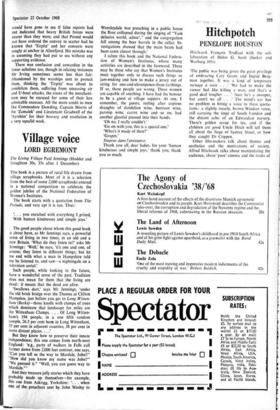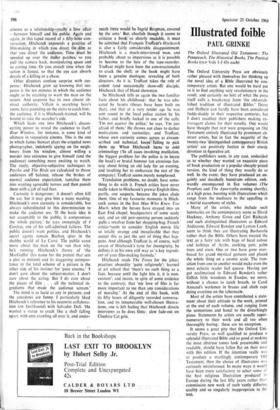Hitchpotch
PENELOPE HOUSTON
Hitchcock Francois Truffaut with the col- laboration of Helen G. Scott (Seeker and Warburg 105s)
'The public was being given the great privilege of embracing Cary Grant and Ingrid Berg- man together. It was a kind of temporary menage a trois . . ."We had to make the viewer feel like killing a man, and that's a good deal tougher . . ."Sure he's a snooper, but aren't we all . . .' The mind's ear has no problem in fitting a voice to these quota- tions: a slightly treacly, brown Windsor voice, still carrying the tinge of South London and the distant echo of an Edwardian nursery. There's golden syrup for tea, and if the children are good Uncle Hitch will tell them all about the Siege of Sydney Street, or how they caught Dr Crippen.
Other film-makers talk about themes and aesthetics and the motivations of society. Alfred Hitchcock talks about manipulating the audience, about 'pure' cinema and the tricks of cinema as a -relationship—really a love affair —between himself and his public. Again and again, in this taped record of a fifty-hour con- versation, Hitchcock expounds a practice of film-making in which you direct the film so that you direct the audience. Time must. be speeded up over the duller patches,• so you pull the camera back, manipulating space and so cutting time. Or you stretch time when the action is fastest, so that the eye can absorb details of a killing or a chase.
Other directors confuse surprise with sus- pense: Hitchcock grew up knowing that sus- pense is the ten minutes in which the audience ought to be straining to warn the man on the screen. And suspense has its own almost ab- stract authority. Villain is searching hero's room, hero pounding up the stairs to catch him: the audience, if it is Hitchcock-trained, will be bound to take the searcher's side.
Which leads one into Hitchcock's discon- certing power to reveal the audience to itself. Rear Window, for instance, is some kind of ultimate in voyeuristic cinema. This is the one in which James Stewart plays the crippled news photographer, indolently spying on the neigh- bours from his window, almost willing a murder into existence to-give hithseif (and the audience) something more exciting to watch. The steely, objective-subjective techniques in Psycho and The Birdssvare calculated to throw audiences off balance, release the brakes of normal audience expectation, tantalise them into wanting agreeable terrors and then punish them with a jab of real fear.
Curiosity is dangerous: it doesn't often kill the cat, but it may give him a nasty mauling. Hitchcock's own curiosity is considerahle, but always subordinated to this determination tp make the audience see. 'If the -basic .idea is not acceptable to the public, it compromises the whole picture,' he says sweepingly of I Confess, one of his self-admitted failures. The public doesn't want politics, and Hitchcock's secret -agents remain Buchan spies in the shabby, world of Le Carre. TTe public' caress more about the man on the run than why he's running. Hitchcock's theory of 'the MacGuffin' (his name for the pretext that sets a plot in motion) and its staggering unimpor- tance in the total scheme of a picture is the other side of his instinct for 'pure cinema.' I don't care about the subject-matter; I don't care about the acting. But I do care about the pieces of film . . . all the technical in- gredients that made the audience scream.'
The mind is as lucid as any in pictures; and the anecdotes are funny. I particularly liked Hitchcock's reference to his eccentric collabora- tion (on Spellbound) with Salvador Dali. 'He . wanted a statue to crack like a shell falling apart, with ants crawling all over it, and under- neath there would. be Ingrid Bergman, covered': by ;the ants.' But, churlish though it seems to criticise a book so sheerly readable, it must be admitted that Francois Truffaut's Hitchcock is _also a fairly considerable disappointment. Hitchcock is a much-interviewed man, and probably about as impervious as it is possible to become to the lure of the tape-recorder. Truffaut might have been the conversationalist to crack the shell; or the book might have been a genuine duologue, revealing of both directors. As it is, Truffaut takes the role of ardent (and occasionally show-off) disciple, Hitchcock that of bland showman.
So Hitchcock tells us again the two familiar facts about his childhood: that he was edu- cated by Jesuits (theses have been built on that), and that at a very tender age he was sent round to the local police station by his father, and briefly locked in one of the cells. `I'm not against the police,' he says, 'I'm just afraid of them.' He throws out clues to darker motivations and curiosities; and Truffaut, whose own curiosity comes across as circum- scribed and technical, keepi' failing to pick them up. When Hitchcock turns to cOld criminology (In all cases involving mutilation, ' the biggest problem for the police is to locate the head') or brutal humour (an atrocious fan- tasy about hiring an old lady for an evening, and insulting her to embarrass the rest of the company), Truffaut seems merely nonplussed.
Translation problems, no douht, have some- thing to do with it. French critics have never really taken to Hitchcock's prewar English films, partly, one suspects, because the jokes elude them. One of my favourite moments in Hitch- cock comes in the first Man Who Knew Too Much, when the heroes have strayed into an East End chapel, headquarters of some seedy sect, and an old pew-opening person suddenly pulls a revolver from her shopping-bag. French -critics %-seein to considei English movie life' so totally strange and inexplicable that they accept this as just the sort of thing that hap-' pens. And although Truffaut is, of Course, well aware of Hitchcock's taste for incongruity, he defines it in his own stiff way as 'a key ingredi- ent of your film-making formula.'
Hitchcock reads The Times for the jokes; practises absurdity 'quite religiously'; learned ' at art school that `there's no such thing as a , face, because until the light hits it, it is non-. existent'; and insists, in spite of some evidence to the contrary, that `my love of film is far more important to me than any considerations of morality.' At the end of this book, with its fifty hours of diligently recorded conversa- tion, and its innumerable well-chosen illustra- tions, one is left feeling that Hitchcock directs interviews as he does films: slow fade-out on Cheshire Cat grin.















































 Previous page
Previous page